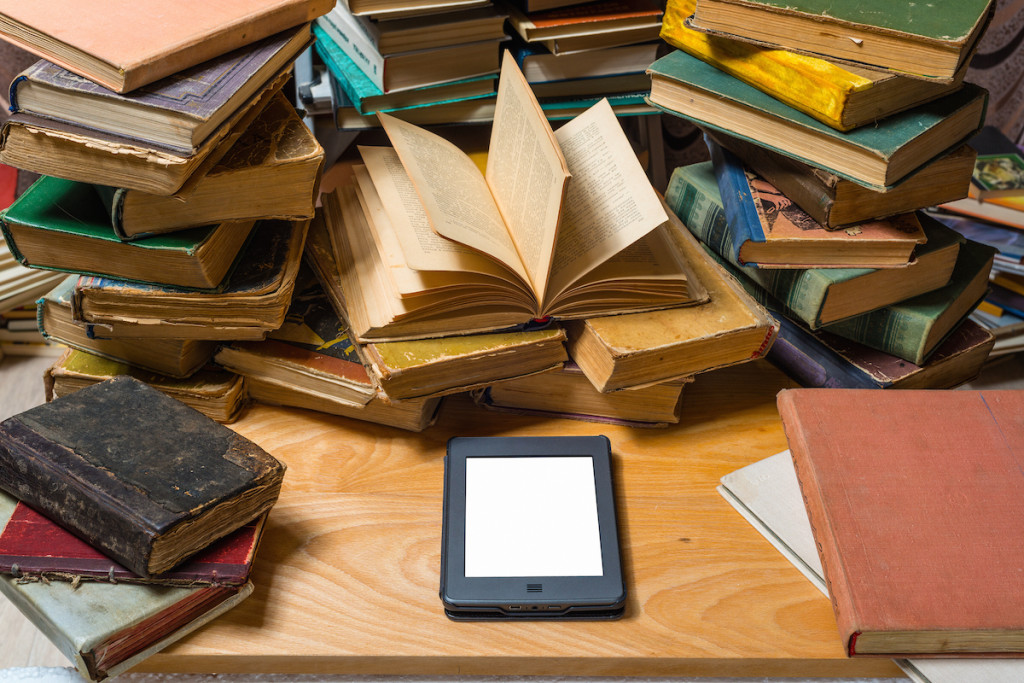With the advancing digital age, the popularity of the ‘e-book’ has risen constantly. Is it time therefore time that we swap the novel gathering dust in the corner for a portable tablet? Or will the sensory experience of reading a traditional paperback always outdo that of the e-book.
The battle of electronic vs. paper is affected by factors such as form and weight. For example: does the kindle fair slightly better in the reading of a longer novel? We must accept that it’s not entirely practical to haul around a copy of War and Peace when a kindle fits nicely into the smallest of handbags, and makes bed-reading easier on the arms. It is also great when you want to enjoy a cheesy quick read on the train; without letting the whole carriage ogle the rosy pink cover of your romance novel. This is where an e-reader may come in handy: a tool for secretive reading in which nosy people can’t pass judgement on your choice of literature, as they smugly read Pride and Prejudice for the 50th time. While a kindle is transportable and private, there is still something missing. The satisfying feel of an old-fashioned book or reading a copy of Wuthering Heights that your mum has kept for 40 years, can’t quite be substituted by the electronic version.
There is nothing like the sense of triumph when you read a classic paperback and can hold the finished product in your hand; flicking back to your favourite sections and highlighting a memorable quote. Yet, at the end of an e-book the only accomplishment comes from a small 100% symbol in the left-hand corner, a definite anti-climax. Reading a paperback is certainly a more sensory experience and engages the reader in ways that the e-book fails to. Turning the pages, reaching the end of a chapter: it is a process, a welcome break from electronic screens. A Guardian survey further supports the popularity of the paperback, “Sales of printed books rose 7% in 2016 while e-book sales fell by 4%”. The e-reader can also house over 500 books; though these often end up being forgotten or overlooked. Whereas, a paperback will sit there proudly and demand to be read. Ultimately, there is something different about actively buying a new book. You see the cover, pick it up and read the blurb; an entirely different experience from lying in bed and lazily purchasing one from Amazon.
As an owner of an e-reader I sometimes feel as if I am cheating on the printed book. However, we cannot ignore the practical benefits. These include: downloading multiple books on one device, an element that could encourage reading as there is no need to coax yourself out of bed to visit the library or a bookshop. The clever kindle will also provide suggestions for your next book based on previous favourites and you can buy an abundance of novels on a budget as e-books are often cheaper. When going on holiday I like to have a stock of books to read, however 7 or 8 thrillers are unlikely to fit in my suitcase amongst my clothes and therefore a portable kindle is often the easier option. Further to this, I learnt the hard way that the paperback is easily susceptible to damage when taken in extreme heat. I borrowed a novel from a friend, one which she explicitly stated must be returned in the same condition. However, I decided to read it on the beach and following the combination of sand and sun, the glue began to melt, and the pages fell out. Ultimately, she received a messy pile of misaligned pages and I was instructed to buy a new one, a painful £8.50 that perhaps could have been spared if I had owned an e-reader.
Overall, if you are a devoted reader who remains on the fence in this debate, it would be wise to consider which is of higher value to you: authenticity or practicality. Ultimately, it seems clear to me that the E-book is practical, but impersonal. The era of libraries and printed novels may have declined, but will certainly not disappear as those looking to immerse themselves in a novel continue to fill bookshops across the country. However, many argue that if you want to read, you should read in any way you want. So perhaps these arguments are merely background noise; if reading itself is not dying out then the form in which a book is read should not matter.
Yelena Zylko
(Image: Geek Wire)

